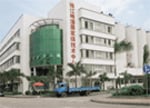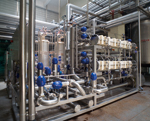Chinese brewery pioneer
The Guangzhou Zhujiang Brewery Co., Ltd. in south China has every reason to be proud of its Zhujiang Beer brand. It has become one of China’s three most well-known beer brands and has even been selected for the national banquets in Beijing.
DATE 2023-11-28 AUTHOR Sijia Xie Located by Zhujiang, or the Pearl River, the headquarters of Zhujiang Brewery is a popular place for tourists to visit in Guangzhou. When they walk down the long glass-walled corridor to get an overview of the production area, they see a clean and bright workplace with just a few people working at the filling and lines packaging.
Located by Zhujiang, or the Pearl River, the headquarters of Zhujiang Brewery is a popular place for tourists to visit in Guangzhou. When they walk down the long glass-walled corridor to get an overview of the production area, they see a clean and bright workplace with just a few people working at the filling and lines packaging.
Mr. Guiquan Fang, Chairman of Zhujiang Brewery Group, is extremely proud of the company’s development during its slightly over 20 years of existence. "In the early 1980s, the beer industry was almost non-existent in Guangdong Province. The Zhujiang Brewery Factory was established to meet a growing demand. The management aimed high from the very beginning."
Forerunner in the industry
A couple of key technicians were sent to Belgium to study advanced brewery techniques. The current Chief Engineer, Huiping Li, was one of them. "We hardly had any time to recover from jetlag when returning from our overseas training before we threw ourselves into the work with our first plant," recalled Li. "We managed to build the first 500,000 hectolitre per year plant within 9 months. This record speed gave rise to the expression "Zhujiang Speed" in China’s brewery industry."
With the support of a substantial government loan, Zhujiang was the first Chinese corporation to introduce overseas advanced brewery technologies and equipment. The first phase involved 14 brand-new technologies including filling lines from Krones and a de-aeration process from Alfa Laval.
These investments made Zhujiang a competitive player even by international standards, let alone compared to domestic companies. "Our move astonished the whole industry," remarks Li. "Few Chinese brewers made investments of this kind and size in those days."
Thanks to the advanced technology which resulted in the unique flavour of Zhujiang Beer, it became No1 in the Guangdong beer market within a few years. Furthermore, it soon ranked as one of the three top brands in China together with Yan Jing and Qingdao. Trucks from all parts of the country can now be seen lining up several hundred metres outside the factory to pick up deliveries.
First in draft beer
If customers order beer in restaurants in the Guangdong area, waiters would ask whether they want Zhujiang or Qingdao. However, if they particularly request a high-end beer such as bottled draft beer, the waiters would bring bottles of Zhujiang without asking. To them, draft beer is Zhujiang.
Zhujiang’s first investments in bottled draft beer were in the early 1990s. It was the time when the Chinese brewery industry prospered due to the government’s encouragement and over 1000 large and small brewers competed on the market. Already a leader in the industry, Zhujiang aimed at developing new products to stand out from the crowd and to defend itself against the downward price pressure on ordinary beer.
"We introduced the first draft beer line in China but no one believed that we would be successful," said Li. "During our research and development phase, even our German partner had doubts about our natural and technical conditions for this venture. They considered Guangzhou to be too humid for producing draft beer and they basically suggested that we change our minds."
However, engineers at Zhujiang were confident about their four years’ of research and experimental results. When Zhujiang Draft Beer finally hit the market, it was an immediate success and the demand increased continuously. Another two draft beer lines were built in 1999 to meet the boom in the market. Today Zhujiang’s production of 350,000 tonnes a year satisfies one third of the draft beer market in China.
In recent years, Zhujiang has carried on the innovative tradition and continued to develop diversified beer products including the first white beer and first ale beer for Chinese consumers. "We have established a partnership with the Belgian Inbev Group to use its global network for faster access to the international market," says Chairman Fang.
Major focus on R&D
As a tradition, the management of the Zhujiang Brewery attaches significant importance to the latest trends in the global beer market. Every year the company sends senior managers to visit top brewers and equipment suppliers all over the world to be "refreshed and upbeat."
Li further explains: "We do not just follow the trend. When we bring in new technology, we evaluate several parameters. Firstly, we investigate whether it really is the best that the world has to offer. Secondly, we calculate what market returns the investment will generate. And thirdly, we find out how compatible it is with our existing technology."
"We distinguish ourselves when it comes to technical development and innovation," says Li. For example, Zhujiang developed its own yeast which fits the local market perfectly. It was based on yeast from an overseas partner, and when it was brought to the original producer for comparison with its origin, it proved to be superior in several respects.
 "We put about 3.5% of our sales revenue into research and development. Last year, our R&D expenses amounted to over EUR 10 million. During the next three years, we will continue to invest at least that amount in R&D," says Li. One proof of the company’s focus on research and development is the Zhujiang Technical Centre, one of the three nationally-certified brewery research centres in China and the hub for some 800 professional technicians.
"We put about 3.5% of our sales revenue into research and development. Last year, our R&D expenses amounted to over EUR 10 million. During the next three years, we will continue to invest at least that amount in R&D," says Li. One proof of the company’s focus on research and development is the Zhujiang Technical Centre, one of the three nationally-certified brewery research centres in China and the hub for some 800 professional technicians.
Technology serving the environment
Since its successful launch of the draft beer, Zhujiang has positioned itself as a producer of mid and high quality products. The company has also built a high quality and health brand image through a number of marketing initiatives. Environmental consideration has always been the key campaign message.
Each type of raw material used in the brewery has to pass "the Green Food Certification." For example, the high quality malt comes from sunny Australia, the rice is selected from China’s top rice fields, the water originates from the fresh upstream of the Dongjiang River and the hops are selected from the quality hops at the foot of the remote Tianshan Mountain. All these ingredients have formed the basis for brewing the excellent Zhujiang Beer.
As early as in 1989, Zhujiang introduced the world’s most advanced yeast management systems from Alfa Laval to re-cycle the used yeast for fermentation and to further utilize the reprocessed yeast. In addition to attaining a high yield of yeast, this method of ‘waste’ treatment has major environmental benefits. Furthermore, the company managed to become a low emission site by treating the waste gas from the generators. "A strong sense of responsibility towards the society is very important to ensure a sustainable development of the corporation," says Chairman Fang.
Since 2003 the Zhujiang Beer Group has cooperated with Alfa Laval in the research into cross-flow filtration for beer clarification. According to Fang, nearly 99 per cent of the beer produced today is filtered through kieselguhr, or diatomaceous earth, which cannot be recycled. Moreover, kieselguhr has negative impact on the environment and its waste has to be treated before disposal.
The cross-flow filtration system will enable Zhujiang to effectively eliminate such problems.
Li comments, "Compared with the traditional technology, cross-flow filtration reduces the consumption of water, power and the waste." The annual output by Zhujiang has now reached 1.5 million tonnes per year. By adopting this new technology, the beer waste as well as the waste treatment costs can be cut considerably. In fact, the company reckons on an investment pay-back time of only three years.
By introducing the cross-flow filtration for the first time in Asia, Zhujiang has taken another innovative step and caused a sensation both in the brewery industry and in the environmental protection sector. "We have great expectations for the future and count on reaching our goal of an annual production of 2.5 million tonnes by 2010," concludes Chairman Fang.
